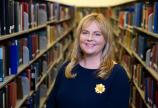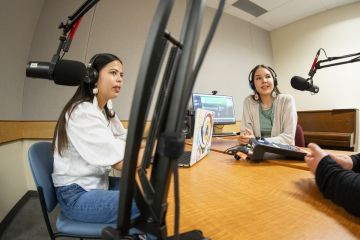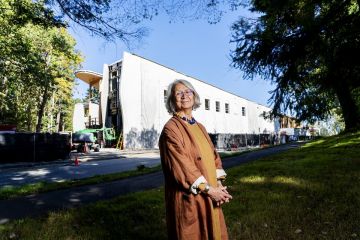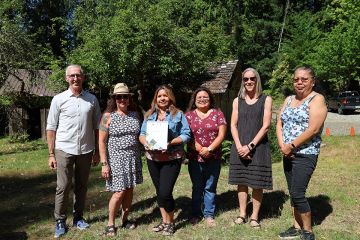Truth-telling journey leads a librarian to the convocation stage
- Lisa Abram
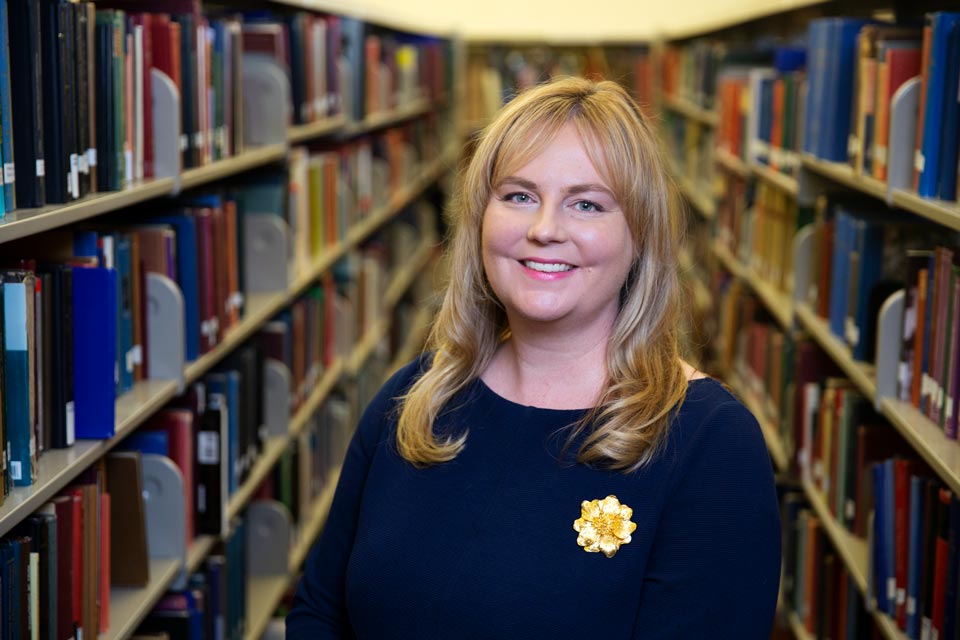
UVic Librarian Pia Russell was inspired by the findings from the Truth and Reconciliation Commission (TRC) to accomplish a fourth university degree, graduating this week in one of the first cohorts in UVic’s new masters in public history program.
On hearing the Honourable Justice Murray Sinclair speak about the TRC at the Woodrow Lloyd Lecture in 2016 at the University of Regina, Russell was moved by his declaration of how decades of exclusionary and biased curriculum within the Canadian school system had impaired how Indigenous and non-Indigenous Canadians relate to one another.
Since 1997, Russell’s career has centred on librarianship, graduating in 2004 with a Masters of Information Studies, and working at UVic Libraries since 2006 as the education, children’s literature, gender studies, and Indigenous studies librarian. Following the publication of the TRC report, Russell’s professional practice has been informed by it, changing her identity in librarianship more than any other issue—including technological innovations in the profession.
“I began to recognize how much privilege I had inherited and at the devastating expense of Indigenous people’s rights that Europeans had taken from them. Through a tenacious process of what scholar Paulette Regan calls unsettling, I have slowly begun to see just how distressing my own education had been,” explains Russell.
In 2014, her research into curating the British Columbia Historical Textbooks collection began when she declared her interest in the history of government approved textbooks. Russell’s realization that these resources could generate the potential for public dialogue drove her to become an authoritative editor of the collection, cementing a decision to improve her historical thinking skills by going back to university as a graduate student. Since then, the textbooks project has become highly collaborative, with multiple units in the library sharing their expertise.
When the new BC curriculum was released in 2016, Russell started to reflect on the library collection and the resources under her purview, wanting to remediate the collection to support her education patrons who were interested in curriculum recommendations and how they could best “unsettle” themselves. With generous supplementary library collection funds, this remediation was made possible.
With the support of University Librarian Jonathan Bengtson, and under the supervision of UVic historian Lynne Marks, Russell completed her MA—Whose History? A Reconnaissance of British Columbia’s First Fifty Years of History Textbooks, 1871-1921—specializing in public history, Indigenous-settler relations, cultural resource management and Canadian history.
On receiving a UVic Internal Research/Creative Project Grant in 2019, Russell began to develop a comprehensive digital library and learning portal of British Columbia’s historical textbooks for public and scholarly audiences. This collection presently focuses on over 500 textbooks authorized for use in BC schools during the first 50 years of the province’s history—of which over 400 titles have been digitized to-date.
While completing her degree, Russell led a triple life as a librarian, student, and mother of two— taking a six-month study leave to complete her coursework while writing her thesis part-time and working with others, including Humanities co-op students, work study students and graduate student curators, all of whom have been instrumental assistants in her historical textbooks research project.
Sophie Crocker, a Young Canada Works intern and UVic graduate working with Pia, recently put together a document listing all other historical textbook collections at English-speaking institutions worldwide. The document demonstrated that very few institutions have digital holdings, revealing UVic Libraries’ international leadership in this important research area.
“A lot of people wondered why I would do a third master's degree, but all along it felt like the right thing to do and now I am so glad I did,” says Russell. “UVic’s history program is superb; I had a phenomenal experience. My supervisor, Lynne Marks, was patient and inspiring. And while the expectations were very high in terms of the amount of reading and calibre of writing required, I now feel so well prepared. The MA in public history gave me the knowledge and confidence to be an authoritative historian of the textbook collection; and of all my degrees, this is certainly my favourite one.”
Along with her passionate embrace of learning the SENĆOŦEN language, Russell is now hoping to scale-up the historical textbooks project to develop a comprehensive digital learning portal with a potential SSHRC grant, now under review. Her new goal is to further encode titles, engage in innovative text and image analysis, develop exhibits and learning tools, and develop national and international collaborations to further engage diverse audiences and build institutional partnerships interested in critical textbook scholarship.
Sinclair’s speech became a lightning rod for her journey to the convocation stage one more time, propelling Russell forward in a quest to demonstrate that libraries are thriving and dynamic spaces of research and inquiry, with a critical role for research librarians to act as truth tellers.
For reconciliation to begin, the truth must first be told, and Russell wants to be part of changing the narrative for the benefit of all by making her research relevant.
Photos
In this story
Keywords: reconciliation, history, library, convocation, colonialism, education, graduate research
People: Pia Russell, Jonathan Bengtson
Publication: The Ring

